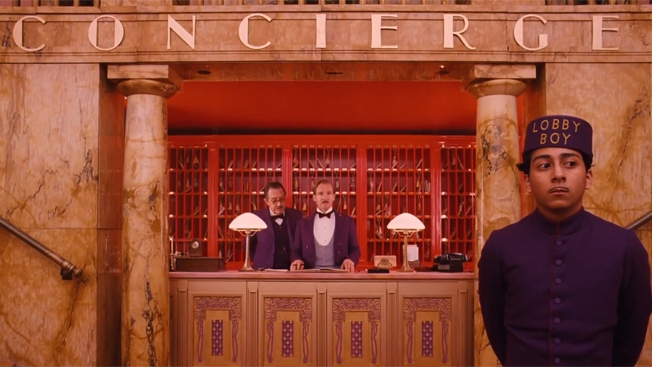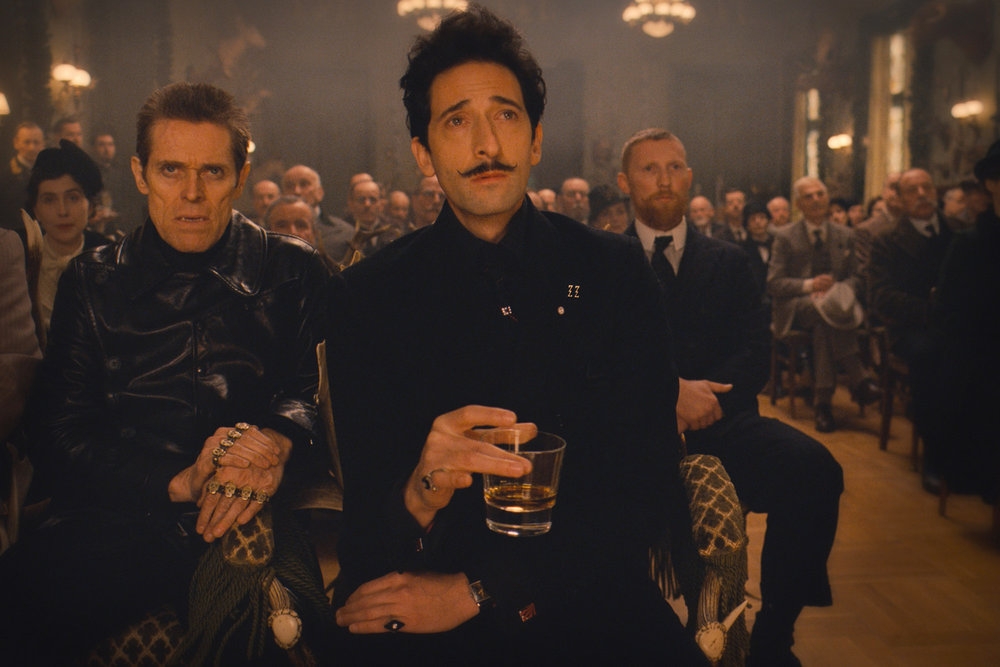AN AWFULLY BIG ADVENTURE // A FILM REVIEW OF "THE GRAND BUDAPEST HOTEL"
 Friday, March 7, 2014 at 12:00PM | tagged
Friday, March 7, 2014 at 12:00PM | tagged  Adrian Brody,
Adrian Brody,  F. Murray Abraham,
F. Murray Abraham,  Hugo Guinness,
Hugo Guinness,  Jeff Goldblum,
Jeff Goldblum,  Jude Law,
Jude Law,  Ralph Fiennes,
Ralph Fiennes,  Saoirse Ronan,
Saoirse Ronan,  The Grand Budapest Hotel,
The Grand Budapest Hotel,  Tilda Swinton,
Tilda Swinton,  Tony Revolori,
Tony Revolori,  Wes Anderson,
Wes Anderson,  Williem Dafoe | in
Williem Dafoe | in  Film Reviews,
Film Reviews,  Reviews by Mateo Moreno
Reviews by Mateo Moreno
 To march inside the mind of Wes Anderson is a guaranteed strange trip. His films, from Rushmore to Moonrise Kingdom expound on originally, strangeness, and overall, to quote the great Mr. Wonka, pure imagination. There are some that don’t particularly care for his brand of candy colored worlds and therefore pass up on the opportunities to see a new Anderson film. I am, however, not one of those people. THE GRAND BUDAPEST HOTEL is, from the opening moments, a sublime journey into the best of Wes Anderson’s uniqueness. It may very well be his best film yet, blending together so well comic moments, heartfelt strings, and a story that zings you right along without ever leaving you behind.
To march inside the mind of Wes Anderson is a guaranteed strange trip. His films, from Rushmore to Moonrise Kingdom expound on originally, strangeness, and overall, to quote the great Mr. Wonka, pure imagination. There are some that don’t particularly care for his brand of candy colored worlds and therefore pass up on the opportunities to see a new Anderson film. I am, however, not one of those people. THE GRAND BUDAPEST HOTEL is, from the opening moments, a sublime journey into the best of Wes Anderson’s uniqueness. It may very well be his best film yet, blending together so well comic moments, heartfelt strings, and a story that zings you right along without ever leaving you behind.
We start in the present, with a young girl visiting the grave of a famed author who wrote the novel “The Grand Budapest Hotel.” We then zoom into the tale told within her book, where the writer (played by Tom Wilkinson) begins to tell a story of his younger self (Jude Law) visiting The Grand Budapest Hotel and a dinner with the owner M. Moustafa (F. Murray Abraham), filled with a grand spinning adventure. He recounts a concierge from 1932 named Monsieur Gustave H. (played with exquisite touches of life by Ralph Fiennes) and how he stumbled into his biggest adventure ever. Gustave’s friend, and lover, Madame Celine Villeneuve Desguffe und Taxis (Tilda Swinton under some amazing makeup) passes away, instructing Gustave to appear at the reading of her Will, which he is accompanied by his ever trusty apprentice and Budapest lobby boy Zero (Tony Revolori). He is left a priceless painting, Boy With Apple, much to the chagrin of her son Dmitri (Adrian Brody) and his psychopathic goon Jopling (Williem Dafoe). From there the film speeds off into a farce, sending Gustave to prison, sending Zero around the fictional former Republic of Zubrowska, and back again, stopping only occasionally for a beheading or two, some chopped fingers, delicious chocolates, and a birthmark in the shape of Mexico. Nope, there is never a dull moment in the heart of the Budapest Hotel.
 Ralph Fiennes is absolutely magnificent in the lead role of the dandy, dashing Gustave. In his comic roles (most notably In Bruges) he always brings a fresh spin to the character and this is no exception. He shines when on screen and his comic timing is simply sublime. As his sidekick, Tony Revolori is deadpan genius, going toe to toe in strangeness with Fiennes. Much like a dashing but villainous classic MGM movie villain, Adrian Brody explodes with finesse, and the always steller Williem Dafoe does not disappoint here (as is the same for the luminous Tilda Swinton). In fact, no one does. Even in the smallest of roles, every actors steps to the plate and knocks it out. Wes Anderson’s script (from a story from himself and Hugo Guinness) is like a triumphant fairy tale masterpiece. Anderson lays in pitch perfect direction and has brought us a film that immediately after you’ll want to watch again. And so you should, for The Grand Budapest Hotel is not somewhere you want to only visit once.
Ralph Fiennes is absolutely magnificent in the lead role of the dandy, dashing Gustave. In his comic roles (most notably In Bruges) he always brings a fresh spin to the character and this is no exception. He shines when on screen and his comic timing is simply sublime. As his sidekick, Tony Revolori is deadpan genius, going toe to toe in strangeness with Fiennes. Much like a dashing but villainous classic MGM movie villain, Adrian Brody explodes with finesse, and the always steller Williem Dafoe does not disappoint here (as is the same for the luminous Tilda Swinton). In fact, no one does. Even in the smallest of roles, every actors steps to the plate and knocks it out. Wes Anderson’s script (from a story from himself and Hugo Guinness) is like a triumphant fairy tale masterpiece. Anderson lays in pitch perfect direction and has brought us a film that immediately after you’ll want to watch again. And so you should, for The Grand Budapest Hotel is not somewhere you want to only visit once.
Mateo’s Grade: A+
Written and Directed By: Wes Anderson Story by Wes Andreson, Hugo Guinness Starring: Ralph Fiennes, Tony Revolori, Tilda Swinton, Adrian Brody, Williem Dafoe, Jeff Goldblum, F. Murray Abraham, Jude Law, Saoirse Ronan, Edward Norton, Léa Seydoux, Tom Wilkinson Rated R (Adult Language, Mild Violence) Now in Limited Release
BOTTOM LINE: If you’re not a fan of Anderson’s, this is the film that will sway you. If you are a fan, you will see it for what it truly is: a masterpiece.






